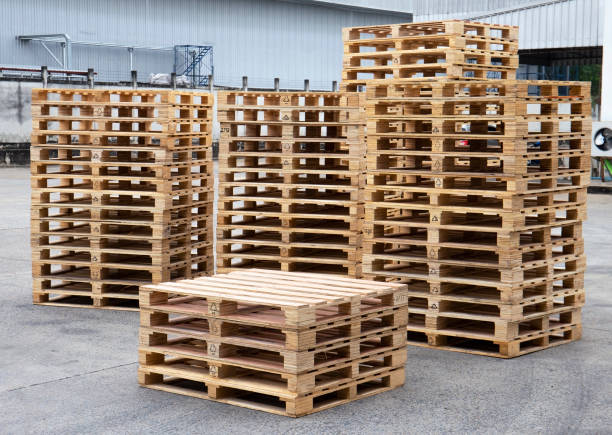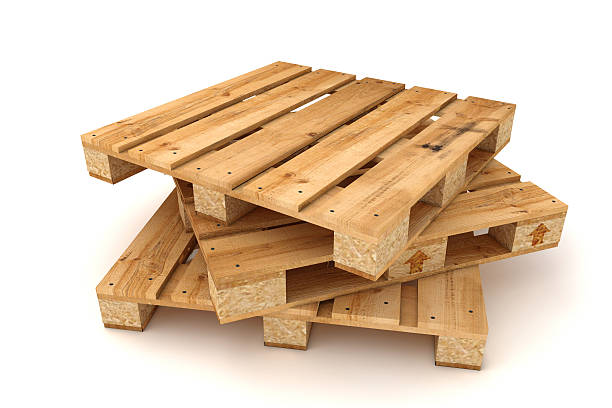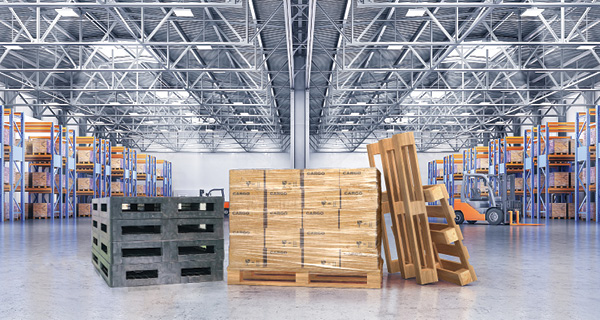The Best Places to Find Free Wood Pallets Near You

Suppose you’re interested in DIY woodworking projects such as patio furniture, compost bins, porch swings, potting benches, or beds. In that case, wood pallets can be a great choice. They are often free and come with a plethora of plans to create something unique.
However, finding free wood pallets near you can be challenging. Despite this, many businesses and individuals dispose of them because they are no longer needed. You can ask local stores for them as they may be willing to hand them over.
To obtain free wood pallets, keep these tips and considerations in mind. Additionally, these same tips apply when searching for free lumber.
What Do Companies Do With Used Pallets?

Large companies such as Home Depot, Lowe’s, and Walmart receive many supplies on wood pallets, which might seem like an opportunity to gather some for your woodworking projects. However, these businesses typically return, recycle, or reuse the pallets internally or with third-party companies. It’s worth asking the store manager, but don’t count on it.
Small businesses may be a better option if you’re looking for used pallets. They may discard their pallets in the dumpster since they can’t afford a hauling company or lack the resources to do it themselves. They may even place them near the dumpsters to be collected by garbage services.
Another excellent source of free pallets is construction sites. Simply call and ask the workers or managers if they have any available for use.
Tip: It’s important to remember that even if pallets are propped up against a wall or located beside trash bins, they may not be available for free. While they likely are, to avoid any potential issues, it’s best to ask for permission before taking them.
How to Find Free Pallets Near You?

When searching for free pallets nearby, start with businesses that use inventory and most likely have pallets available. These may include:
- Construction sites and builders
- Hardware stores
- Equipment stores
- Small garden shops
- Furniture Stores
- Grocery stores
- Newspaper companies
- Pet stores
However, if you plan on using grocery stores as a source for free pallets, be sure to inspect them thoroughly for any spills or stains. Some stains may turn into mold over time.
It’s also essential to note that according to a 2010 study by the National Consumers League, 10 per cent of pallets carrying food produce had E. coli bacteria. Although there hasn’t been an update to this study, exercise caution when considering supermarket pallets.
Become Your Own Pickup Service
If you are looking for a steady source of free pallets, consider offering a “trash pickup service” for small businesses that need to dispose of their pallets. You can take the pallets off their hands for free, helping them get rid of their waste while obtaining the materials you need for your DIY projects.
You may find local businesses constantly getting rid of pallets, and you can ask if you can take them. If they already have someone who disposes of their pallets, you could offer your services for free, letting them know that you’re interested in using the pallets for DIY projects. Any excess pallets you collect could be given to someone else who needs them or taken to a dump.
This type of arrangement could evolve into a more meaningful relationship with the business. They may contact you if they have other types of waste that could be useful for your projects at home.
Finding Pallets from Distribution Centers

If you need help to obtain pallets from the company that receives them, consider contacting the distribution centre that ships them.
They may have pallets that are suitable for their machinery or need to meet their standards. Ask if they can reserve these pallets for you to pick up.
Additionally, you can search for pallet recycling companies. They can provide you with free pallets or offer them at a low cost.
Utilize Online Resources
To find free wood pallets, it can be advantageous to connect with people who have extra pallets and are willing to work with you. An online search for “free pallets near me” or “free wood pallets in my area” can provide useful outcomes. You can also create an “ISO” (in search of) post, asking for free or reasonably priced pallets. Websites such as Facebook, other social media platforms, and Freecycle, a website for finding free items, can also provide helpful resources.
Furthermore, it may be beneficial to propose a clean exchange. For instance, you can propose a trade if you possess extra materials such as unused lumber, garden seeds, or stones that someone else might desire. Alternatively, you could come across someone who wants their pallets to be picked up and cleared, giving you the opportunity to collect and utilize them.
Safe Use of Pallets at Home
Inspecting the Wood
When selecting pallets for use at home, those from the dry goods industry may be the best choice since they typically carry lighter-weight goods and are less likely to have spillage or food stains. Be sure to examine the wood carefully for protruding nails and splinters and significant cracks or splits on both sides of the pallet. It is also essential to avoid pallets with grease or oil stains, as these can be challenging to remove or cover up.
Tip: When handling or collecting pallets, it is important to always wear sturdy gloves. In case you intend to see or sand a pallet, it is also necessary to use eye protection and a mask.
Examine the Pallet’s Stamps and Markings
When looking at pallets, check for any stamps or markings that may be present. The absence of markings may indicate that the pallet came from a domestic source. However, it should have an International Plant Protection Convention (IPPC) stamp if it is from an international source.
The IPPC has approved various markings for pallets, including:
HT (Heat Treated)
The pallet underwent heat treatment using conventional steam or a dry kiln heat chamber.
DH (Dielectric Heated)
The pallet underwent heat treatment using dielectric heating, such as microwaves or radio frequencies.
MB (Methyl Bromide)
The pallet underwent methyl bromide treatment, which involves fumigation with chemicals that leave a residue.
SF (Sulphuryl Fluoride)
The pallet underwent sulphuryl fluoride treatment, which involves fumigation with chemicals that leave a residue.
Warning: Toxic chemicals in pallets can pose a severe health risk to humans and the environment. Therefore, it’s best to avoid using chemically treated pallets, especially for indoor use or with edible plants. When cutting, sanding, or burning these pallets, it’s possible that toxic pesticides and rodenticides may be released into the air, which can be harmful.
Comparison of Wood and Plastic Pallets

For years, wood pallets have been the go-to shipping, warehousing, and distribution option. Businesses have typically relied on wood pallets as the only feasible choice. Plastic pallets were not even a consideration for many manufacturers and distributors until recently.
Wood pallets are the most commonly used type of pallet. In the United States, almost 2 billion pallets are used daily, with around 90% to 95% of them made of wood. About 40% of these wood pallets are used to store and ship food products.
So, why do most businesses prefer wood pallets? Wood pallets have certain benefits that many companies consider essential. Yet, plastic pallets are slowly being recognized as the best option. Also, with regulations of government in place that require the use of hygienic materials, businesses have many reasons to consider the advantages of plastic pallets. With recent reports of major brands being involved in recalls and lawsuits, it is important for companies to start exploring the food safety of plastic versus wood pallets.
Pros and Cons of Wood Pallets
Wood pallets are a popular choice in warehouses due to their economic benefits:
Affordability
Wood pallets are somewhat inexpensive to build and purchase. An average recycled wood pallet costs around $10, making them a cost-effective option for many businesses.
Durability
Wood pallets are durable and can resist many supply chain trips without supervision. Repairs are often easy to perform.
Recyclability
Wood pallets can be disassembled and repurposed to create new ones, expanding their lifespan.
However, despite their affordability, wood pallets have some flaws that make them an unwanted option for certain businesses and industries:
Low-quality standards
Many wood pallets are constructed with low standards, which can result in splits and exposed nails, creating safety hazards for material handlers.
Unsanitary material
Wood is prone to attracting insects and fungi, which can be carried into facilities, posing a risk to sensitive cargo such as food.
Food safety risks
The biggest disadvantage of wood pallets is the risk they pose to food safety. Wood is a cellulose material that absorbs moisture, leading to mold and bacterial growth when exposed to water or ageing untreated wood.”
Advantages and Disadvantages of Plastic Pallets
Plastic pallets are quickly gaining popularity and are being considered as an industry standard. They offer several advantages, making them a wise investment for businesses.
Plastic pallets have the following benefits:
Enhanced Durability: Plastic pallets are designed to be longer lasting than wood pallets, making them a more durable alternative.
High-Quality Construction: Many plastic pallets are created through an injection moulding process, ensuring high-quality construction.
Eco-friendliness: Plastic pallets made from recycled plastic material are eco-friendly and can be recycled.
Efficient warehouse organization: The nestable feature of plastic pallets makes them an excellent asset for efficient warehouse organization, a feature wood pallets lack.
Worker Safety: Plastic pallets prevent worker exposure to sharp edges and nails, enhancing worker safety.
Food Safety Compliance: Plastic pallets comply with food safety regulations and standards and do not harbor harmful substances like mold, fungi, bacteria or insects.
Plastic pallets have the following flaws:
However, plastic pallets have a few disadvantages that need to be considered:
Higher Initial Cost: Plastic pallets are initially more expensive than wood pallets but offer a better return on investment.
Shipping complexities: Some companies may need help managing plastic pallets, which can be lost during transportation.
Wood Pallet Safety Risks for the Pharmaceutical Industry
Health risks associated with wood pallets are not limited to food loads. They can also jeopardize the safety of pharmaceutical loads, making wood pallet drug safety risks a cause for concern, particularly for senior citizens and individuals with compromised immune systems. In 2010, for example, Tylenol’s Arthritis Pain caplets were recalled due to customer complaints of stomach pain, diarrhea, vomiting, and musty odour.
Investigation revealed that a fungicide used on the wood pallets caused the contamination, which was triggered by moisture. Such chemical reactions can compromise the safety of drugs, leading to unpleasant symptoms and potentially fatal outcomes. Fortunately, regulatory measures have been put in place to eliminate the risks of food and drug contamination from wood pallets.”
Cherry’s Industrial Offers Sanitary Plastic Pallets for Food and Pharmaceutical Distribution
For businesses operating in food or pharmaceutical distribution, switching to sanitary plastic pallets is advisable to comply with government regulations and maintain food safety. These pallets, made of plastic, offer an improved solution over traditional wood pallets and can be a wise investment that can lead to better warehouse efficiency and reduced product damage.
Cherry’s Industrial Equipment provides an extensive range of plastic pallets that cater to your needs in terms of load capacity. Additionally, they offer equipment such as pallet retrievers, pallet inverters, stretch wrappers, and pallet washers and dryers to keep the pallets sanitary. Get in touch with Cherry’s Industrial Equipment today to learn more and place an order for your sanitary plastic pallets.
Some FAQs
What toxic chemical is on pallets?
The toxic chemical that can be found on some pallets is methyl bromide, which is used as a fumigant and pesticide. However, this chemical has been banned in many countries due to its harmful effects on human health and the environment.
Are pallets toxic?
Not all pallets are toxic, but some can be. It depends on the type of wood used to make the pallets and any chemicals or treatments applied to them. To ensure safety, it is advised to use plastic or heat-treated wooden pallets that are certified as safe for use in the food and drug industries.
Why are pallet beds toxic?
Pallet beds can be toxic if they are made from pallets that have been treated with chemicals or have been disclosed to harmful substances. It is important to use pallets that are certified safe for use and have not been treated with toxic chemicals.
Is pallet food safe?
Some pallets can be food safe, but it depends on the type of pallet used. Plastic pallets and heat-treated wooden pallets that are certified safe for use in the food and drug industries are the best opportunities to ensure food safety.
Are pallets full of chemicals?
Pallets can contain chemicals if treated with preservatives or pesticides. However, not all pallets are treated with chemicals. It is essential to use pallets that are certified safe for use and have not been treated with harmful substances.
What is a pallet for good food?
Pallet for good food refers to pallets specially designed and certified as safe for use in the food and drug industries. These pallets are made from materials that are non-toxic and do not pose a risk of contamination of food or medicine products. Using pallets for good food can help provide food safety and observation with regulations.
Conclusion
In conclusion, wood pallets have been used as an option due to their affordability and availability. However, they have many flaws, including safety risks to food and worker injuries, drug products, and environmental problems. As a result, many industries are now switching to plastic pallets, which offer many benefits like material handling efficiency, improved durability, worker safety, and observation with food safety rules. As the market becomes more competitive and safety regulations become stricter, businesses need to consider these factors and make informed decisions about their choice of pallets.
Related Articles
- What Colors Go With Purple?
- The Best Places to Find Free Wood Pallets Near You
- 15+ Best Tiny Home Kits of 2023(Benefits, Drawbacks, and Features)
- Christmas Flowers For Magical And Enchanting Christmas Decorations
- Top 14 Small Outdoor Kitchen Ideas For Your Backyard
- Clever Kids Room Decoration Ideas
- Best Flowering Plants For Hanging Baskets
- Creative Front Door Decor Ideas To Beautify Your Home Entrance
- 11 Best Kitchen Wall Decor Ideas
- 12 Best Modern House Interior Ideas






